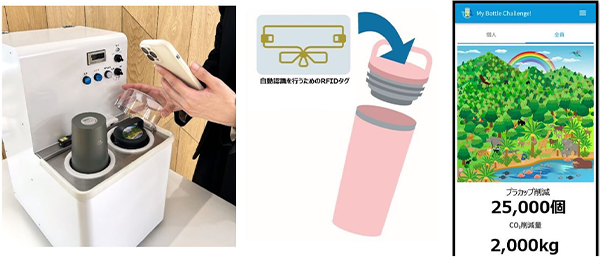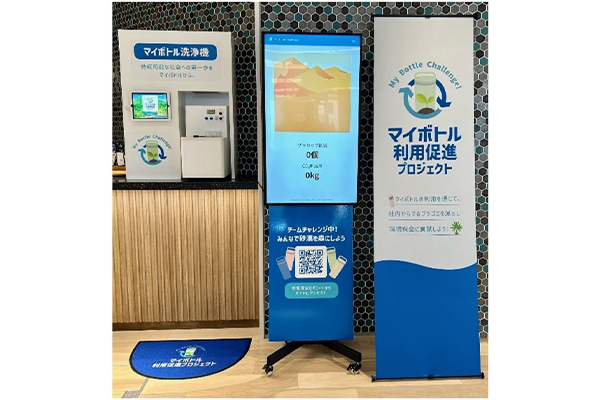Apr 23, 2024
SATO Holdings Corporation (TOKYO: 6287), the corporate strategy, planning and administrative unit of the SATO Group and Zojirushi Corporation launched a joint research trial with the Research Institute for Humanity and Nature (RIHN) in April 2024 to promote the use of vacuum insulated mugs.
As part of the research, a trial is underway to promote reusable bottle usage at SATO’s HQ in Tokyo from April 1, 2024, to September 30, 2024, involving 200 employees.

Concerns about plastic waste prompts collaboration
Despite many consumers claiming to own reusable water bottles, the majority still rely on single-use plastic cups, hindering efforts to reduce plastic waste. This discrepancy between intentions and actions prompted SATO and Zojirushi to take proactive steps.
At SATO Holdings Corporation's headquarters café, a staggering 25,000 plastic cups are used annually, with a mere two percent bringing their own reusable bottles. Recognizing this as both an environmental concern and a missed opportunity for sustainability leadership, SATO conducted research to identify potential solutions to encourage widespread adoption of reusable bottles among employees.
Their investigation revealed Zojirushi Corporation's innovative bottle washer system, designed to facilitate the use of personal reusable bottles in the workplace and public spaces. Inspired by Zojirushi's initiatives, SATO has now partnered with the appliance manufacturer and RIHN in a joint research and development project.
The collaboration aims to develop and implement strategies that promote regular use of reusable bottles, to ultimately reduce plastic waste. By combining SATO’s expertise in tagging and data utilization, and Zojirushi’s “lifestyle solutions,” the organizations hope to pave the way for a more sustainable future, one bottle at a time.
Outline of the trial
This trial to promote reusable bottles in the office is one part of a joint research project.
Bottles tagged with RFID1 labels are given a unique ID. A bottle washing machine with an RFID reader installed in the SATO office café. A reader automatically registers when the bottle was washed and an app tracks the number of times each bottle has been washed. Based on the washing frequency, the system calculates the CO2 emissions reduction based on the number of unused plastic cups.
 Bottle washing machine, RFID-tagged bottle caps and cumulative data of CO2 savings
Bottle washing machine, RFID-tagged bottle caps and cumulative data of CO2 savings
With the app, users can see their personal results, including the number of plastic cups saved and their CO2 reduction. Coupons for the office café will also be given to those based on the number of times they wash their bottle. As the number of plastic cups reduced and the amount of CO2 emissions reduced by all participants increases, a graphic of a desert becoming a lush forest will visualize the environmental effects of participants’ actions.
By visualizing the effects of each individual's actions while providing financial incentives, the project will test whether this system can promote a change in awareness toward the use of reusable bottles, to promote continuous use of reusable personal bottles.
The effectiveness of the trial will be evaluated and verified through cooperation with research group led by Professor Misuzu Asari of RIHN, whose research themes include waste and education on environmental goals and UN Sustainable Development Goals.

During the trial, companies are welcome to visit the SATO showroom (Minato-ku, Tokyo)2 to view a demo.
By sharing details of the environmental impacts of this initiative with the business community, we aim to expand the use of reusable bottles.
- 1.RFID (Radio Frequency Identification) uses radio waves to wirelessly read data to identify and manage objects. Familiar examples include self-checkout systems in apparel stores, smart cards, smart keys, etc.
- 2.Tours by appointment only. Contact grp-mybottle(@)sato-global.com
About the Research Institute for Humanity and Nature
he Research Institute for Humanity and Nature (RIHN) is a national institute established in Kyoto in 2001. RIHN aims, through research that integrates the humanities and sciences, to address environmental issues concerning the relationship between "humanity" and "nature" in a broad sense as fundamental issues of human culture. We strive not only to engage the research community but also to collaborate with diverse stakeholders in society, including local residents, to find solutions to global environmental problems. https://www.chikyu.ac.jp/
About Zojirushi Corporation
Since its establishment in 1918, Zojirushi has been delivering comfortable and convenient products for daily life while staying close to the lives of its customers under the corporate philosophy of "Creating Better Quality of a Life". Today, Zojirushi supports our customers' daily lives by offering a wide variety of "cooking appliances" such as rice cookers and electric griddles, thermal products such as vacuum insulated mugs and household appliances such as humidifiers.
| Headquarters | 1-20-5 Tenma, Kita-ku, Osaka City |
|---|---|
| Representative | Norio Ichikawa, President and Chief Executive Officer |
| Capital | 4,029.95 million yen |
| Business description | Manufacture and sale of cooking appliances, household appliances, living room appliances, and other products, as well as business incidental thereto |
| Company website | https://www.zojirushi.co.jp/ |




